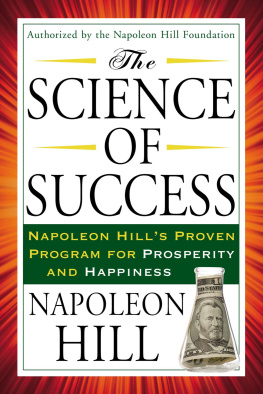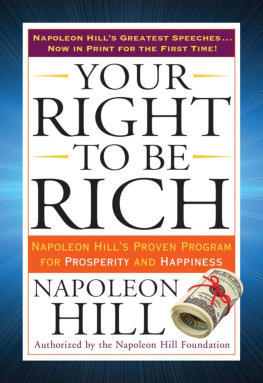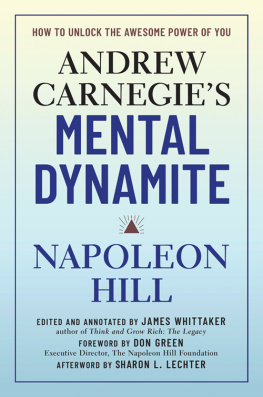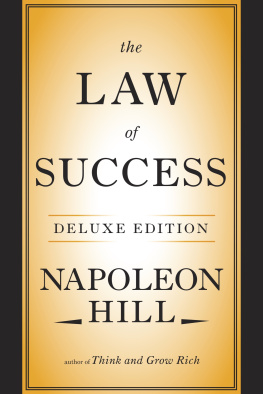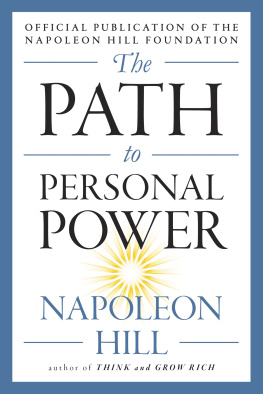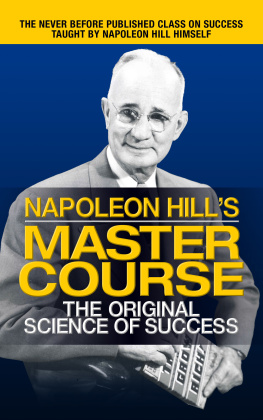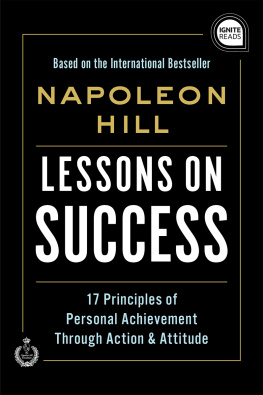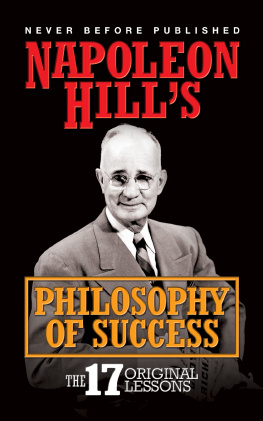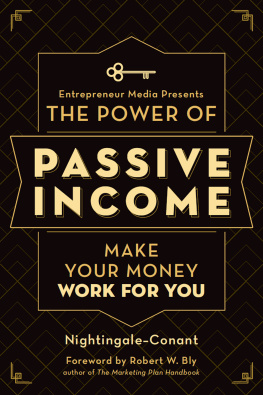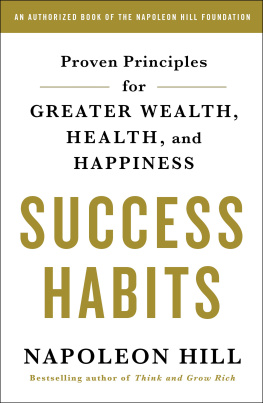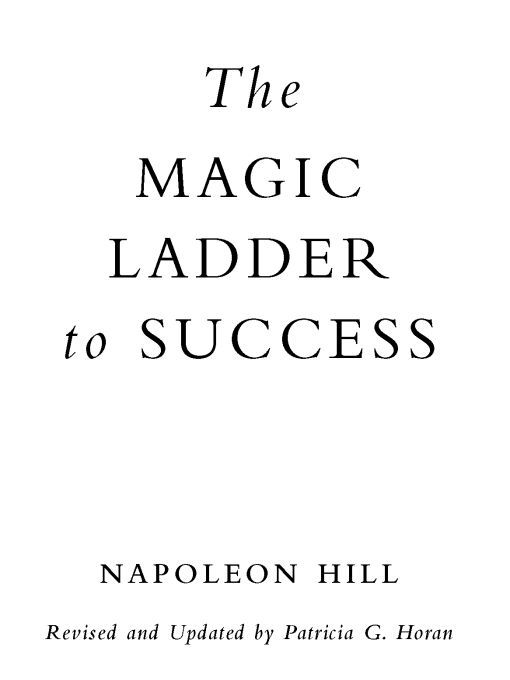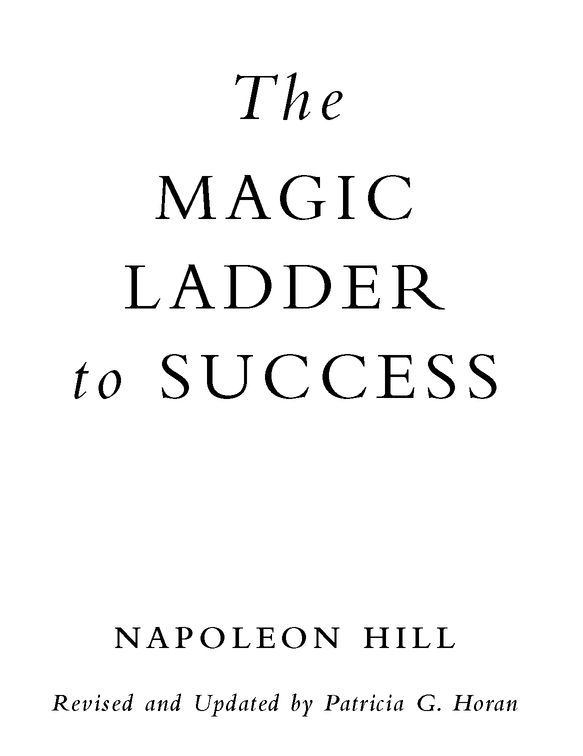Table of Contents
ALSO AVAILABLE FROM TARCHER SUCCESS CLASSICS
The Law of Success
Napoleon Hill
The Master-Key to Riches
Napoleon Hill
Think and Grow Rich
Napoleon Hill
The Think and Grow Rich Workbook
Napoleon Hill
Your Magic Power to Be Rich!
Napoleon Hill
How to Prosper in Hard Times
Includes Napoleon Hill,
James Allen, Joseph Murphy
As a Man Thinketh
James Allen
Acres of Diamonds
Russell H. Conwell
A Message to Garcia
Elbert Hubbard
The Science of Getting Rich
Wallace D. Wattles
The Science of Being Great
Wallace D. Wattles
The Master Key System
Charles F. Haanel
The Secret of the Ages
Robert Collier
Public Speaking for Success
Dale Carnegie
In Tune with the Infinite
Ralph Waldo Trine
Prosperity
Charles Fillmore
The Game of Life and
How to Play It
Florence Scovel Shinn
JEREMY P. TARCHER / PENGUIN
a member of Penguin Group (USA) Inc.
New York
FOREWORD
by Patricia G. Horan
In this book are the success secrets of magnates, tycoons, moguls, and captains of industry. They are towering figures whose names live in history, not in infamy. Unlike the headline makers of today, they are geniuses, not jail-birds; winners, not whiners. They had more than clout: They had class. Though they were by no means saints, they were undoubtedly larger than life, often doing what others said couldnt be done. At a time of bottom-feeders, when books are cooked and stockholders scandalized, we need the wisdom of our American Giants more than ever. They were the stuff of legends.
How did theyAndrew Carnegie, Alexander Graham Bell, Henry Ford, P. T. Barnumdo it? What was going through their minds as they blazed trails through the wilderness and created the infrastructure of this nation?
Many of them were born into impoverished circumstances. What personal alchemy turned their less-than-promising beginnings into pure gold? What is it that makes a winner?
Out of the same unforgiving circumstances came a man who set out to find the answers to this central question. With a letter of introduction from Carnegie himself, he found out these secrets by doing what no one had thought to do before: He asked the greatest how they became great. In the process, against all odds, he became a winner himself. He invented motivational writing, ultimately finding himself listed as a peer with Marcus Aurelius, Ralph Waldo Emerson, and Ben Franklin.
He was five-foot-six and his name was Napoleon, but no Waterloo ever defeated him and he refused to languish in exile. Napoleon Hill was the guru of all success gurus, and the author of the number one motivational seller of all time, Think and Grow Rich, which would never have seen the light of day without the book you are holding in your hands. (Think and Grow Rich may not have seen the light of success, either, if the publishers choice of titles had prevailed, since it would have been known as Use Your Noodle to Earn More Boodle!)
More than forty years after it was published, a USA Today survey of biz leaders named Think and Grow Rich one of the best-selling inspirational business books ever and one of the five most influential books in its field. The same magical material contained in that book can be found in this one, which could only have been stopped in its tracks by the financial disaster that brought the rest of America to its knees.
The Magic Ladder of Success was published at the start of the Great Depression, seven years before Think and Grow Rich, so its chance at success was washed away along with the American economy. But the ideas in this book proved themselves to be great, and they seeded the better-known book to follow. In Magic Ladder, Hills famous Seventeen Laws of Success were tried, tested, and found to work miracles. In this book Napoleon Hill brings together wisdom straight from the minds of the greatest names in American business history, the result of five hundred interviews with the business giants of Hills time.
In 1908 steel magnate Andrew Carnegie, son of penniless Scottish immigrants, stood in the library of his 124-room New York City mansion. He took his gold watch from his pocket and gave the young Napoleon Hill a challenge. The twenty-five-year-old reporter had been commissioned by former Tennessee Governor Robert L. Taylor to write success stories about leading business leaders for his magazine. Carnegie would be his first assignment, and the steel baron had already spent three days and nights with Hill. Carnegie saw something in Hill he liked, a younger, shorter reflection of himself, perhaps, and now it was his turn to ask the questions.
Would Hill be interested in compiling the beliefs and practices of the business giants of the time into a coherent philosophy? Without any payment?
Napoleon Hill took twenty-nine seconds to answer. Good, Carnegie said as he put away his watch. I was planning on giving you only sixty seconds.
Perhaps it was that incident that confirmed one of Hills beliefs: Successful people make decisions quickly and change them slowly. Unsuccessful people make decisions slowly and change them often.
Napoleon Hill would go on to become an adviser to President Franklin Delano Roosevelt. He later took credit for writing We have nothing to fear but fear itself and several of FDRs famous Fireside Chats. His life would prove to be more a roller coaster than a yellow brick road. Several of his businesses went bankrupt, he lost jobs, and he was wrongly accused of fraud and put into prison. One of his two sons was born without ears. Hills work took him away from his family so much that one of his sons was adopted by a family member.
His life was such a series of victorious failures that, when in his fifties, he marveled that an entire decade had gone by without his having to face a personal disaster. But Napoleon Hill, often down but never out, never wavered from his definite chief aim. He was to teach millions around the world that even luck can be changed and failures put to good use. How else would he have known that firsthand?
Success requires no explanation. Failure permits no alibis, he would later say with the authority only experience can offer.
Napoleon Hill was born in 1883 in a one-room cabin in the hills of aptly named Wise County, Virginia. A wild, gun-toting, untamed child, he began his writing career at age thirteen as a mountain reporter for small-town newspapers, and never lost his hunger for real facts about real people who overcame odds. It was this childhood job that taught him how to interview the 500 people whose philosophies of success are distilled into this books coherent wisdom.
His is one of those it-seemed-to-be-bad-but-it-turned-out-good stories. His mother died when he was very young, but the educated, audacious woman his father then married was impatient with poverty, as he later put it. Hills stepmother took responsibility for the family store and farm, sent his father to dental school at the age of forty, and gave Napoleon the backbone he needed to climb out of his Virginia mountain. She placed in his mind the thought he would become most famous for: What the mind of man can conceive, he can achieve.


